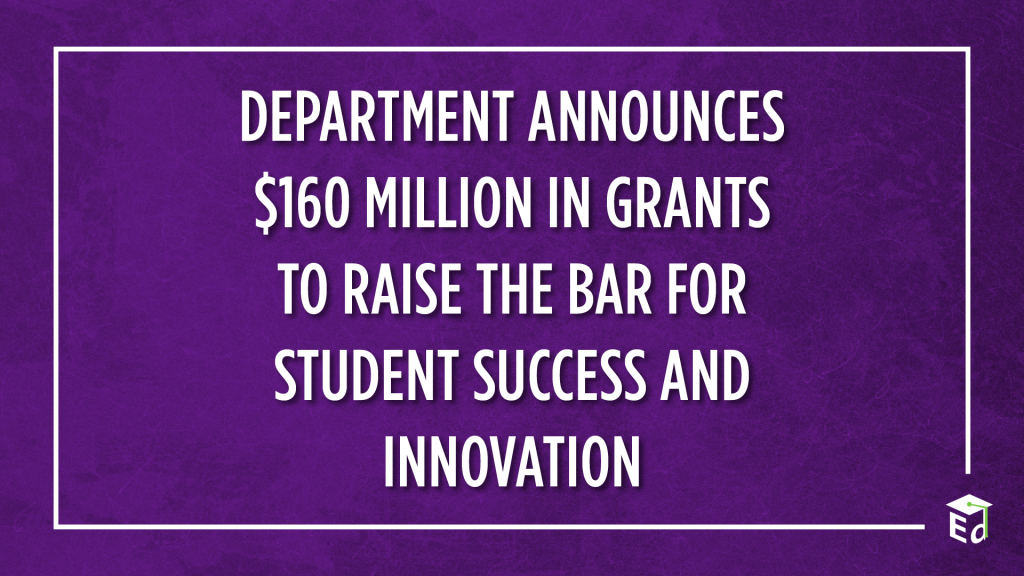Secretary Cardona has challenged us to not just refine the same strategies but to make the most of this once-in-a-generation opportunity to transform education. We have a clear challenge to reimagine our schools, and the Department is making investments in education innovation through programs like EIR and other federal grants.
The Department recently announced $160 million in new grant awards through the Education Innovation and Research (EIR) program. This year’s cohort of grantees is comprised of 28 entities that include state education agencies, local education agencies, institutions of higher education, and nonprofit organizations across the U.S. Through the EIR program, grantees will design, scale, and validate programs that can help solve education’s most pressing problems. Most importantly, they’ll be working to address the continuing impacts of the COVID19 pandemic.
Here are 5 examples of how EIR grantees are responding to support students:
- San Diego Unified School District introduces work-based learning experiences
EIR funds will help support the development of the district’s MetaSocratic Peer Tutoring Project. Tenth through 12thgrade math students from across the district will be paired with 9th-11th graders to provide math tutoring. Through this experience students will be introduced to education and child development career pathways. Work-based experiences like this can help students better decide career pathways and feel better prepared to enter the workforce.
- CommonLit, Inc. offers a blended learning curriculum to help student achievement in reading, writing, speaking, and listening
CommonLit, Inc. was awarded EIR funds to advance a blended learning curriculum for grades 6-12. The curriculum will include aligned PD, assessments, and school district support framework. Through digital assessments, teacher professional learning, and cultural and technology-based supports, the project helps students improve their English Language Arts skills.
- Wisconsin Center for Education examines a web-based classroom assessment system
EIR funds will help the Wisconsin Center for Education examine a web-based classroom assessment system that promotes data-driven instruction and student autonomy. This program supports high-need middle school science learners, particularly multilanguage learners. Visuals, graphics, animations, and on-screen assists will help students who would otherwise be disadvantaged by traditionally language-heavy assessments.
- The M-SENS project led by the University of Oregon Foundation develops a program to support kindergarten student math achievement and support positive behavior management strategies
The “Math Ready-Supporting Early Number Sense (M-SENS)” at the University of Oregon Foundation was awarded EIR funds to work with kindergarten teachers to integrate positive behavior management strategies. M-SENS is meant to help students improve in math faster, reduce challenging behavior in whole-class settings, and give teachers more tools to help students with their early math and behavior needs.
- The RWDS project from PREP- KC helps students solve real-world challenges and become data scientists
EIR funds were awarded to the “Real World Data Science (RWDS)” project from PREP-KC to help middle school students learn data science skills. Through the program, students prepare for a STEM-focused career by combining STEM learning with hands-on learning. Industry professionals serve as mentors and experts on the subject matter. Students will solve problems in data science that come from the Kansas City area and their own interests. These real-world problems are the core of a curriculum that aims to make every student feel like a data scientist and align data science instruction with important math and science standards, which will help students do better in STEM-focused classes.
These FY22 grantees reflect Secretary Cardona’s priority to promptly respond to the effects of the pandemic and ensure that all students have equal access to high-quality educational opportunities, as well as the FY22 directive from congress to prioritize innovations focused on social-emotional learning and Science, Technology, Engineering, and Math (STEM).
Learn more about the EIR program and see the full list of grantees: https://oese.ed.gov/offices/office-of-discretionary-grants-support-services/innovation-early-learning/education-innovation-and-research-eir/awards/


